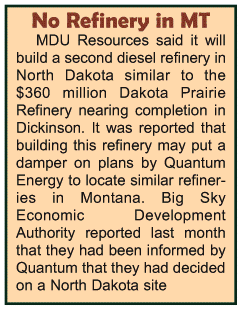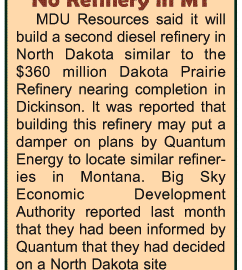This headline from The Big Sky Business Journal’s Hot Sheet seems to say it all…

Instead of Montana, another North Dakota location appears to be the lucky winner. From the MT Chamber of Commerce e-update:
PrairieBizMag.com: Developers of a nearly-completed diesel refinery near Dickinson, ND, are eyeing the Minot area as the potential site for a similar plant. WBI Energy, a subsidiary of Bismarck-based MDU Resources Group, developed the Dickinson refinery with Indianapolis-based Calumet Specialty Products Partners LP.
Gee…this oughta help recruit more businesses to Montana:
KULR8-TV: Montana tax authorities appeared before the Montana Supreme Court last Tuesday to argue Cloud Peak Energy owes $3.4 million in taxes. State district Judge Jeffrey Sherlock ruled in favor of Cloud Peak last year.
Here’s a must-read piece by Daniel Yergin in The Wall Street Journal for those of us back here in the Bakken country of Montana and North Dakota: The Global Shakeout From Plunging Oil
The decision by members of the Organization of the Petroleum Exporting Countries on Thursday not to cut production reflects a profound shift in the world oil market. The demand for oil—by China and other emerging economies—is no longer the dominant factor. Instead, the surge in U.S. oil production, bolstered by additional new supply from Canada, is decisive. This surge is on a scale that most oil exporters had not anticipated. The turmoil in prices, with spasmodic plunges over the past few days, will likely continue.
It is now clear that the new U.S. production is more resilient than anticipated. There has been a widespread view that at around $85 or $90 a barrel extracting “tight” oil from shale would no longer be economical. However, a new IHS analysis based on individual well data finds that 80% of new tight-oil production in 2015 would be economic between $50 and $69 a barrel. And companies will continue to improve technology and drive down costs.
The OPEC members in big trouble are the “have-nots”—those with small financial reserves and high government budgets. No country clamored more loudly for OPEC production cuts than Venezuela. Once an oil powerhouse, Venezuela depends on oil revenues for up to 65% of government spending. But its production has fallen by a third since 2000. Owing to gross mismanagement, Venezuela’s economy is already in chaos, its political system in crisis and unrest is mounting. And Venezuela would be the No. 1 loser if the Keystone XL pipeline is built, as production from Canadian oil sands would displace Venezuelan heavy oil from its largest single market, the U.S. Gulf Coast refineries.
TheBlaze.com: Falling Oil Prices Just Put Two Major U.S. Shale Basins in the Red
Two of the most important U.S. shale basins, Bakken and Permian Basin, have already turned into money-losing projects, Sober Look’s Walter Kurtz noted on Saturday, as oil prices plummeted towards $60 per barrel following OPEC deciding against cutting production on Thursday.
The Daily Caller: Which Huge, Embarrassingly Backward European Country Is Financing Massive Fracking Protests?
Last year, rural and otherwise very obscure parts of Romania became a destination for zealous anti-fracking activists after Chevron, an American company, began exploratory drilling. Clashes between police and protesters became violent.
The same basic scene has also played out in Lithuania and Bulgaria.
Many Romanian officials blame the Russian government and Gazprom, a huge Russian corporation (that was the Soviet Ministry of Gas Industry until 1989), for financing and organizing the movement to demonize fracking.
